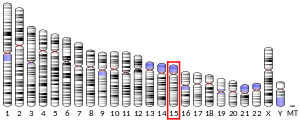WDR72
Protein-coding gene in the species Homo sapiens
| WDR72 | |||||||||||||||||||||||||||||||||||||||||||||||||||
|---|---|---|---|---|---|---|---|---|---|---|---|---|---|---|---|---|---|---|---|---|---|---|---|---|---|---|---|---|---|---|---|---|---|---|---|---|---|---|---|---|---|---|---|---|---|---|---|---|---|---|---|
| Identifiers | |||||||||||||||||||||||||||||||||||||||||||||||||||
| Aliases | WDR72, AI2A3, WD repeat domain 72 | ||||||||||||||||||||||||||||||||||||||||||||||||||
| External IDs | OMIM: 613214; MGI: 3583957; HomoloGene: 52326; GeneCards: WDR72; OMA:WDR72 - orthologs | ||||||||||||||||||||||||||||||||||||||||||||||||||
| |||||||||||||||||||||||||||||||||||||||||||||||||||
| |||||||||||||||||||||||||||||||||||||||||||||||||||
| |||||||||||||||||||||||||||||||||||||||||||||||||||
| |||||||||||||||||||||||||||||||||||||||||||||||||||
| Wikidata | |||||||||||||||||||||||||||||||||||||||||||||||||||
| |||||||||||||||||||||||||||||||||||||||||||||||||||
WD repeat-containing protein 72 is a protein that in humans is encoded by the WDR72 gene.[5] WDR72 contains 7 WD40 repeats, which are predicted to form the blades of a 7 beta propeller structure.
Clinical significance
Mutations in this gene cause autosomal-recessive hypomaturation amelogenesis imperfecta.[6]
References
- ^ a b c GRCh38: Ensembl release 89: ENSG00000166415 – Ensembl, May 2017
- ^ a b c GRCm38: Ensembl release 89: ENSMUSG00000044976 – Ensembl, May 2017
- ^ "Human PubMed Reference:". National Center for Biotechnology Information, U.S. National Library of Medicine.
- ^ "Mouse PubMed Reference:". National Center for Biotechnology Information, U.S. National Library of Medicine.
- ^ "Entrez Gene: WD repeat domain 72".
- ^ El-Sayed W, Parry DA, Shore RC, Ahmed M, Jafri H, Rashid Y, Al-Bahlani S, Al Harasi S, Kirkham J, Inglehearn CF, Mighell AJ (November 2009). "Mutations in the beta propeller WDR72 cause autosomal-recessive hypomaturation amelogenesis imperfecta". Am. J. Hum. Genet. 85 (5): 699–705. doi:10.1016/j.ajhg.2009.09.014. PMC 2775821. PMID 19853237.
Further reading
- Rose JE, Behm FM, Drgon T, et al. (2010). "Personalized smoking cessation: interactions between nicotine dose, dependence and quit-success genotype score". Mol. Med. 16 (7–8): 247–53. doi:10.2119/molmed.2009.00159. PMC 2896464. PMID 20379614.
- Kamatani Y, Matsuda K, Okada Y, et al. (2010). "Genome-wide association study of hematological and biochemical traits in a Japanese population". Nat. Genet. 42 (3): 210–5. doi:10.1038/ng.531. PMID 20139978. S2CID 30790619.
- Gerhard DS, Wagner L, Feingold EA, et al. (2004). "The status, quality, and expansion of the NIH full-length cDNA project: the Mammalian Gene Collection (MGC)". Genome Res. 14 (10B): 2121–7. doi:10.1101/gr.2596504. PMC 528928. PMID 15489334.
- Ota T, Suzuki Y, Nishikawa T, et al. (2004). "Complete sequencing and characterization of 21,243 full-length human cDNAs". Nat. Genet. 36 (1): 40–5. doi:10.1038/ng1285. PMID 14702039.
- Bonaldo MF, Lennon G, Soares MB (1996). "Normalization and subtraction: two approaches to facilitate gene discovery". Genome Res. 6 (9): 791–806. doi:10.1101/gr.6.9.791. PMID 8889548.
- Paterson AD, Waggott D, Boright AP, et al. (2010). "A genome-wide association study identifies a novel major locus for glycemic control in type 1 diabetes, as measured by both A1C and glucose". Diabetes. 59 (2): 539–49. doi:10.2337/db09-0653. PMC 2809960. PMID 19875614.
- Köttgen A, Pattaro C, Böger CA, et al. (2010). "New loci associated with kidney function and chronic kidney disease". Nat. Genet. 42 (5): 376–84. doi:10.1038/ng.568. PMC 2997674. PMID 20383146.
- El-Sayed W, Parry DA, Shore RC, et al. (2009). "Mutations in the beta propeller WDR72 cause autosomal-recessive hypomaturation amelogenesis imperfecta". Am. J. Hum. Genet. 85 (5): 699–705. doi:10.1016/j.ajhg.2009.09.014. PMC 2775821. PMID 19853237.
- v
- t
- e
















